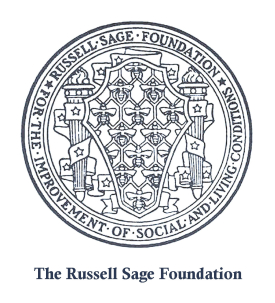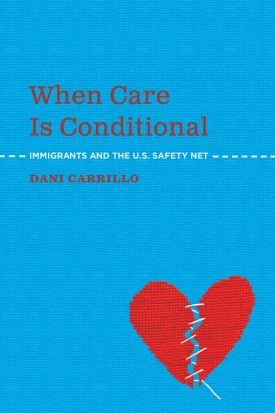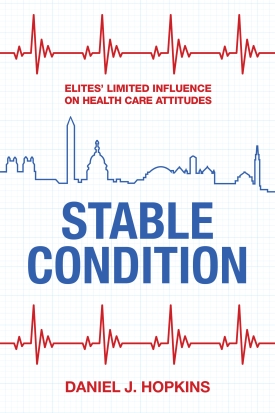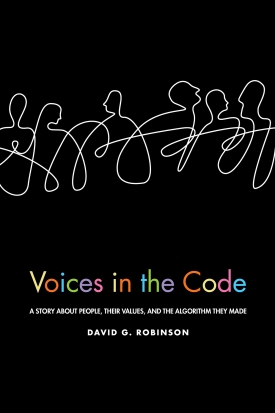"When Care Is Conditional brings together trenchant analysis and deeply moving humanity to understand the barriers faced by Latinx immigrants and their strategies for well-being as they negotiate conditional care in the United States. Through nuanced research and the voices of ordinary people, Dani Carrillo shows how immigration policy, residential location, and, especially, gender shape who can get help, how much, and under what conditions. Beautifully written, this book is a must-read for scholars, policymakers, and philanthropists dedicated to advancing everyone’s well-being."
—IRENE BLOEMRAAD, Class of 1951 Professor of Sociology, University of California, Berkeley
"When Care Is Conditional is a critical reassessment of the failure of social protection in the United States through the lens of low-wage immigrants. Dani Carrillo offers a bottom-up examination of the patchwork of safety net institutions and the perennial difficulty of accessing them. In doing so, she disrupts the idyllic view of the suburbs and reveals how immigrant networks and civil society try to help fill in the gap. More than just a structural accounting, this book centers the importance of cultural narratives and stigmas in reinforcing 'conditional care' and in doing so helps us understand the dynamics of exclusion for all vulnerable racialized communities."
—SHANNON GLEESON, Edmund Ezra Day Professor and chair, Department of Labor Relations, Law, and History, Cornell University
"Dani Carrillo deftly weaves policy history with personal narratives of Latinx immigrants to lay bare how restrictive immigration policies undermine the well-being of families that too often are living in the shadows of our communities and society. The book comes at a critical time in our national, state, and local dialogue around immigration and social policy. When Care Is Conditional is critical reading for scholars, policymakers, and practitioners alike."
—SCOTT W. ALLARD, Associate Dean for Research and Engagement and Daniel J. Evans Endowed Professor of Social Policy, Evans School of Public Policy and Governance, University of Washington
From its inception, the public safety net in the United States has excluded many people because of their race, gendered roles, or other factors. As a result, they must prove their moral worthiness to get resources for themselves and their families. In When Care Is Conditional, sociologist Dani Carrillo reveals the ramifications of this conditional safety net by focusing on one particularly vulnerable population: undocumented immigrants.
Through in-depth interviews with Latinx immigrants in northern California, Carrillo examines three circumstances—place, gender, and immigration status—that intersect to influence an individual’s access to health care, food assistance, and other benefits. She demonstrates that place of residence affects undocumented immigrants’ ability to get care since more services are available in urban areas, where many immigrants cannot afford to live, than suburban areas, where public transportation is limited. She also shows that while both men and women who are undocumented have difficulty obtaining care, men often confront more challenges. Undocumented women who are pregnant or mothers are eligible for some government safety net programs and rely on informal coethnic networks or a “guiding figure”—a relative, friend, neighbor, or coworker—who explains how to get care and makes them feel confident in accessing it. Most undocumented men, in contrast, are not eligible for public programs except in a medical emergency and often lack someone to guide them directly to care. Men sometimes steer one another to jobs through worker centers—where they may learn about various services and take advantage of those that increase their employability, like English or computer classes—but a culture of masculinity leads them to downplay medical problems and seek health care only in a crisis.
As undocumented immigrants navigate this exclusionary system, Carrillo finds that they resist the rhetoric stigmatizing them as lawbreakers. Dismissing the importance of “papers” and highlighting their work ethic, they question the fairness of U.S. immigration policies and challenge ideas about who deserves care.
Carrillo offers concrete recommendations, such as improving labor conditions and reexamining benefit eligibility, to increase access to care for not only undocumented immigrants but also people who have been excluded because of their race, criminal record, gender identity, sexual orientation, or disability. She argues that working with and across populations creates a powerful form of solidarity in advocating for inclusive care.
When Care Is Conditional provides compelling insights into how safety net and immigration policies intersect to affect people’s everyday lives and calls for a cultural shift so that the United States can provide unconditional care for all.
DANI CARRILLO is a senior researcher and civic technologist.




